
WHAT IS SIDECHAINS
Sidechains are means for safely transferring digital assets from one blockchain to another before returning to the original blockchain. Most blockchains experience congestion and scalability concerns, in addition to the lake of blockchain scalability, which is seen in the proof-of-work consensus process, as well as other variables such as the amount of activities that occur in the blockchain, affecting transaction speed and scalability. The Ethereum blockchain is one example of a blockchain that has been affected by such a problem.
SIDECHAINS WITH THE USE OF ZK-ROLLUPS
ZK-Rollups are zero knowledge rollups that belong to layer 2 and are a sidechain of the Ethereum blockchain that provides solutions to the network's scalability problem. Hundreds of transactions are wrapped up into a single transaction with the aid of ZK-Rollups. Zero knowledge proof is a strategy. The smart contract assigned to this job will use this to validate and deconstruct all of the transfers in a single transaction.
ZK-Rollups also plays a key role in lowering the costs associated with various blockchain applications, which can render the platform unviable. ZK-rollups are currently being developed to address Ethereum's scalability issues.
WORKING OF ZK-ROLLUPS
The ZK-Rollups function by processing calculations off-chain before sending them to the Ethereum blockchain for batch-by-batch certification. This allows a transaction series to be confirmed by a single validation transaction, which then adds off-chain transactions to the main chain following confirmation. This is accomplished by constructing a cryptographic proof from ZK-Rollups, which might be either SNARK or STARK. These cryptographic proofs are used to update, validate, and add batches originating from ZK-Rollups to the Ethereum main chain.
Advantage and Disadvantages
• Layer 2 performance and scalability are improved when each transaction contains less data.
• The distribution is driven by a parallel computing paradigm that computes blocks.
• Cost reduction per user transaction
Disadvantages
• The initial setup of ZK-Rollup promotes a centralized scheme (see Security Considerations)
• The security scheme assumes an unverifiable level of trust
• Due to the difficulties of computing evidence without prior information, data optimization is required to attain maximum results across the board.

Liquid Network is a bitcoin sidechain that aims to offer fast and confidential transactions between major trading platforms allowing users to convert fiat money tokens, securities, and other assets. Liquid's connector and consensus management are overseen by a Federation of Officials. L-BTC is the native token.
It has the following major characteristics;
• Final settlements are completed quickly.
• Transactions that are kept private
• Tokenization that is safe
• Interoperability
How does Liquid Network work?
The Bitcoin utilized in Liquid Network is known as L-BTC, and each L-BTC is equal to one BTC from the original chain, which may be verified and guaranteed by the network's "officials."
It allows users to send and receive Bitcoin across the Bitcoin and Liquid networks via a two-way link called "peg-in" (input) and "peg-out" (Exit).
Peg-in
The process of transferring funds from Bitcoin to Liquid is known as "peg-in." When a user makes this step, Liquid Network creates a peg-in transaction that allows them to claim their Liquid Bitcoin equivalent (L-BTC).
The peg-in transaction requires 102 confirmations on the Bitcoin network in order for the money transferred to be claimed on the Liquid Network. This is done to secure users' funds as much as possible.
Peg-out
Peg-out, on the other hand, is the reversal of peg-in, in which money are returned from Liquid to the Bitcoin chain, and it takes roughly 17 minutes. Officials known as "watchmens" process transactions here, and will only transmit Bitcoin to an address controlled by an authorized user.

The procedures to link the Polygon network wallet to the Metamask wallet are shown below.
• Firstly I have to install meta mask on Chrome. Click on install meta mask.
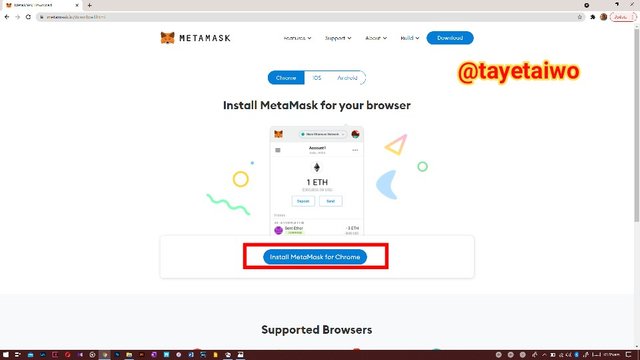
• Add it to my chrome extensions.
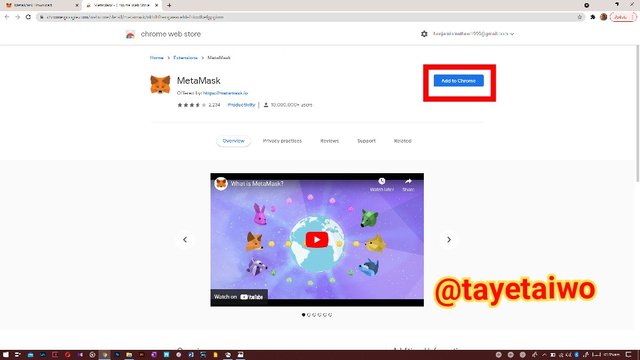
• The next step is to go to the Polygon website, where I will be presented with three alternatives. Because I need to connect to metamask, select metamask.
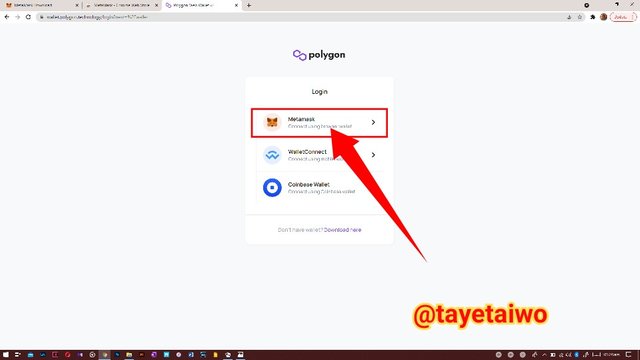
• After clicking on connect on Metamask, the following step is to click on GET STARTED to get started with Metamask.
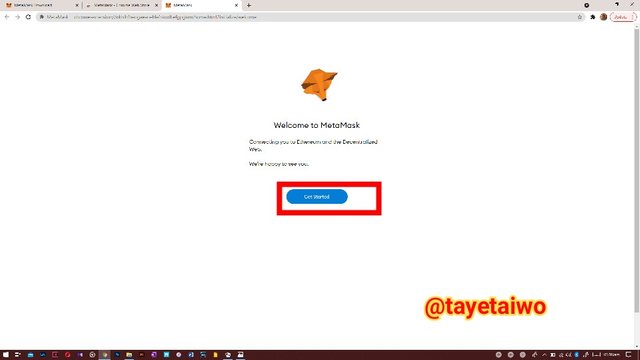
• After that, I'll be asked to import or create a wallet. I choose to make a new one because I didn't have one.
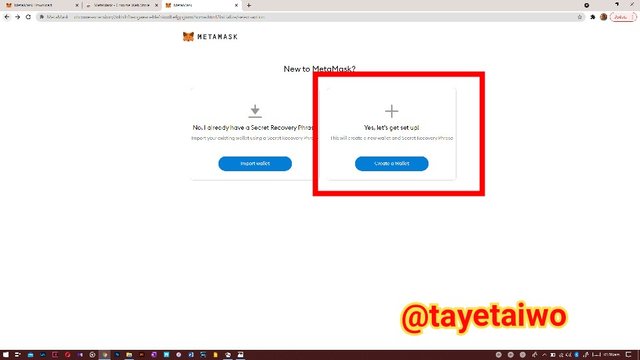
• Some information will be presented, and I will be asked whether I agree or reject the conditions. To continue, click I AGREE.
.png)
• Because I'm creating a new Metamask wallet account, I enter the new wallet's password, read and accept the conditions, and then created the wallet.
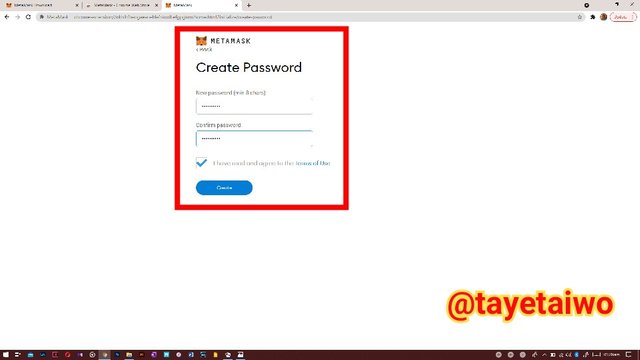
• I will be presented a video that you must view in order to learn about your recovery phrase; after watching it, click next.
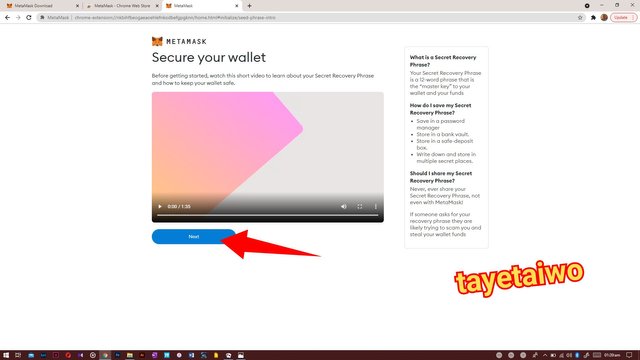
• I've successfully constructed our wallet; the next step is to connect it to my polygon network wallet.
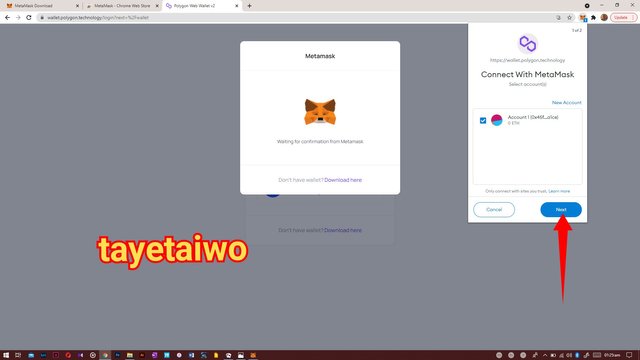
• Following the next button, I will be led to a new page where I must authenticate my identity before selecting link wallet, as seen in the picture below.
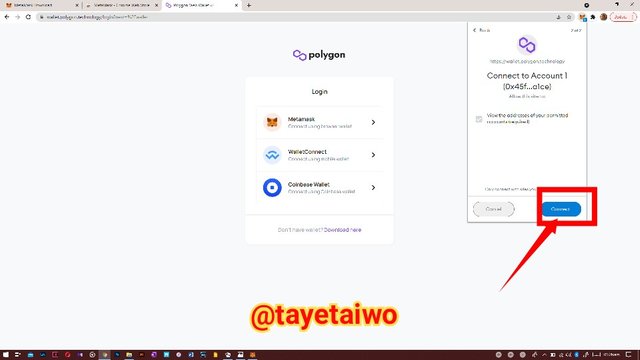
• Close the page after clicking connect wallet and return to the polygon network's main page, which is polygon, and click CONNECT TO METAMASK. I'll see a tab that asks you to sign the transaction.
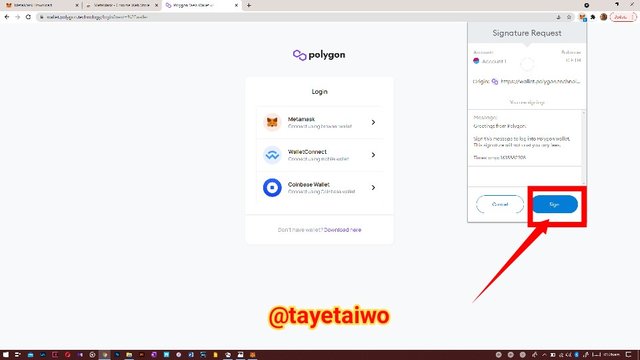
• Lastly I will click on SIGN and your metamask and polygon wallets will be linked.
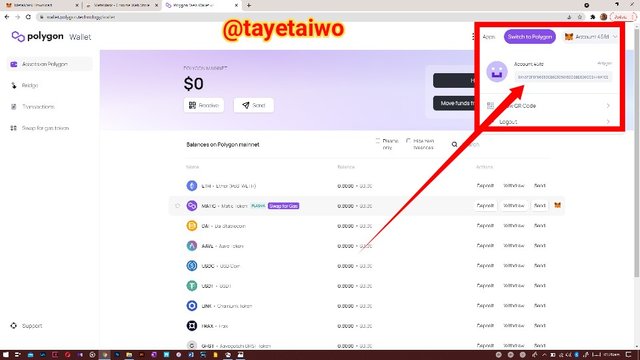
• My wallet is now connected
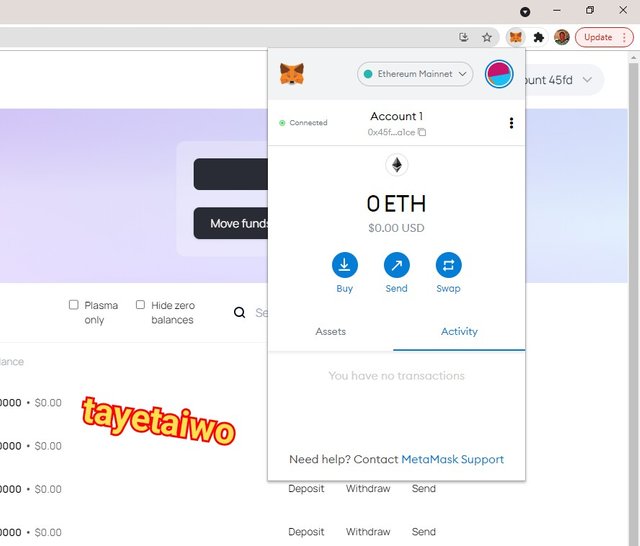

- Block 25,000,000:
To get started, go to the PolygonScan website. Press the search button after typing 25000000 into the search form.
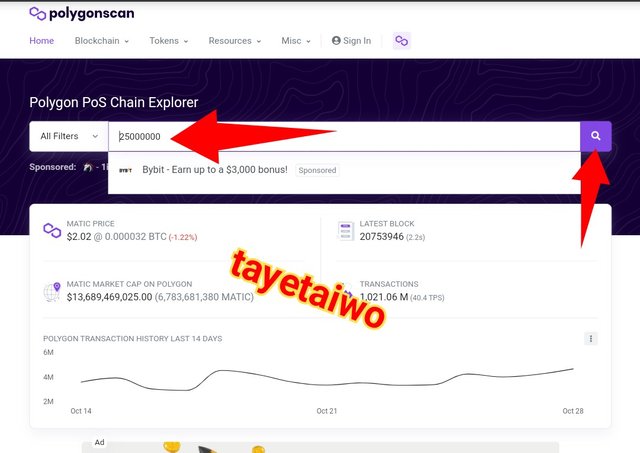
After that we will find all the details about the block. The details of the searched block given below.
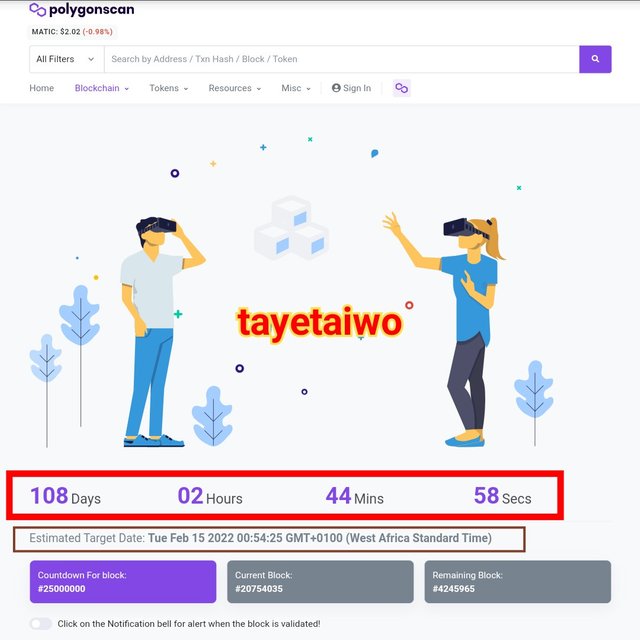
Block: 25000000
Target Date: Tue, Feb 15, 2022
Time: 0:54:25 GMT+0100 ( West Africa standard Time)
Remaining block: #4245965
- Block 12,000,000:
Now, in the same way as in the previous block, go to the search field and write 12000000, then press the search button.
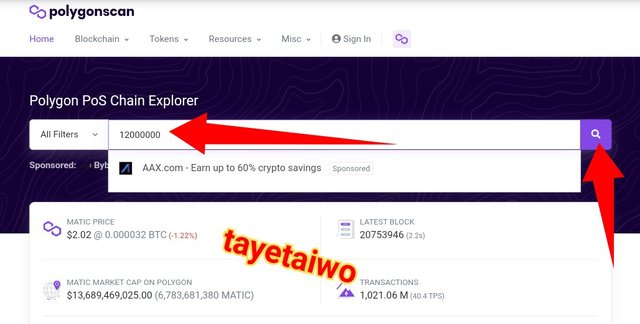
Below are the specifics of the block that is created.
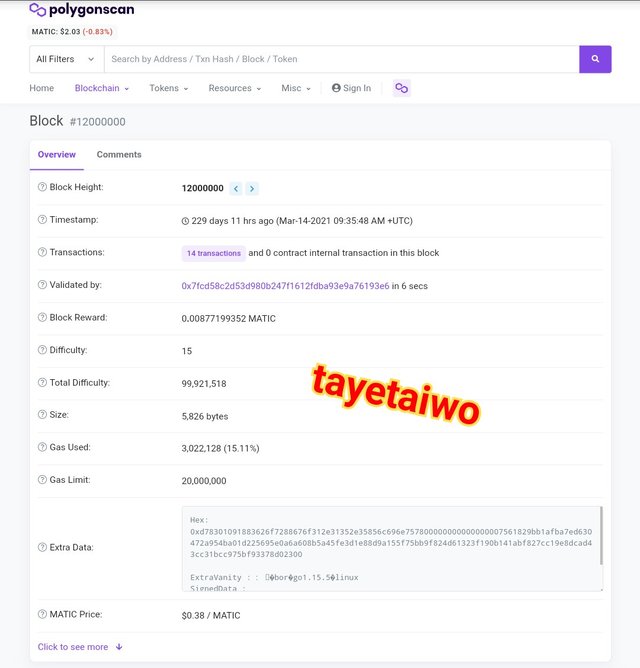
Block: 12000000
Timestamp of block: 229 days 11 hrs ago
Date: March 14, 2021
Time: 09:35:48 AM +UTC
Transaction: 14
Price of matic: $0.38

Finally, the polygon network is great, with high-quality Proof-Of-Work that swiftly creates blocks. The network made it easy for people to access information about previously built blocks that had been successful. Moreover, liquid Sidechains have various advantages in the blockchain industry, the most notable of which is their speed and scalability. One thing that individuals want is the ability to complete successful transactions quickly. There isn't much else to say except that the network's decision to provide opportunities will assist many individuals in remaining true and honest.

Thank you professor @pelon53 for this insightful lecture. God bless you!

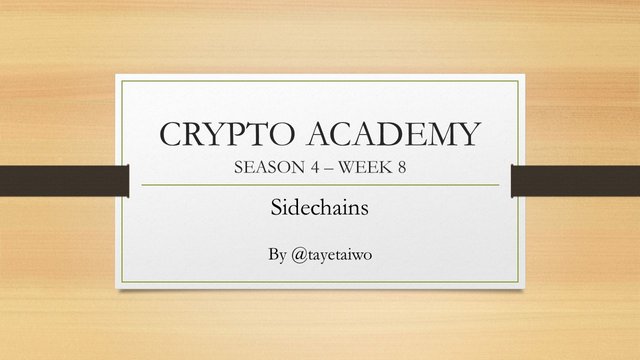
.jpeg)
#club5050 😀
Downvoting a post can decrease pending rewards and make it less visible. Common reasons:
Submit